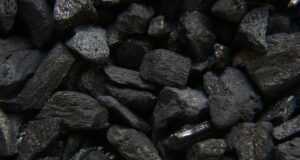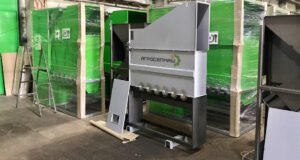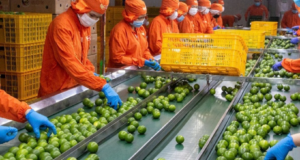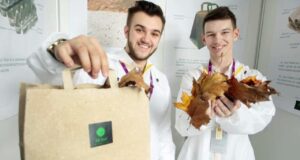Erwin Andreycic, the farmer from the Slovenian town of Grahovo can accurately say what fat content will have the milk of the future yield. His compatriot, the farmer Jacob Stehr from Duplje can easy predict when it will be necessary to use fertilizers but avoid their washing away by rain. This year, their colleague Vasiliy Poltorak from Poltava is not going to spend any time on closing the accounts – a computer will do it for him. Pantheon business operating system from Datalab helps all the three farmers to live and work. The smart software fertilizes the fields, waters gardens, monitors the health of domestic animals and draws up financial statements.
Now the Datalab software is used by more than 44,000 users around the world. Last year, the company’s revenues increased by 9% – to EUR 7.2 million. A month ago, the company opened its office in Ukraine. “You aspire to join the EU, and we can help you to become as effective as European farmers are,” says Kristina Kuznetsova, the director of the Datalab office in Kyiv.
The company’s history began in 1997. Slovenia became an independent state after the breakup of Yugoslavia and started actively rebuilding the allied economic model in the European manner. One of the main tasks of the new government was to free domestic business from the numerous bureaucratic barriers. Two Slovenian programmers Andrew Mortar and Tomaž Teyrovski decided to help their compatriots. The partners created Datalab Company, whose specialization was making applications for small and medium businesses. Their first product was a special app which carefully counted the companies’ costs and revenues and presented them in standard accounting reports. Such a computer assistant allowed carrying out management without accountants and economists. The first tests were held successfully – small agricultural companies saved on accounting services from EUR 2,000 to 10,000 per year. The software became a hit in the market – the number of its users has grown to several hundred in three years.
Even more work was at Datalab in 2004, when Slovenia joined the European Union. Many of Slovenian farmers hoped for joining the subsidy scheme, which is offered to small agricultural companies in the EU. But there were only the EU standards in the way – very few people in the country were familiar with them. According to Kristina Kuznetsova, the director of the Datalab representative office in Ukraine, one could expect subsidies from the European Commission only having impeccable documentation. Mortar and Teyrovski decided to take advantage of the situation. They have studied the standards of submitting reports to the EU regulatory authorities and developed software that automatically collected information not only on the farm work, but also sent the documents to the EU inspectors. This software has become one of the most popular systems for business at the time. In 2005, the company’s revenues grew by 50% – to EUR 368,000. “This software was very important to farmers because the EU subsidies could cover up to 50% of all the farmer’s costs. This is a very significant sum of money for small farms,” Kuznetsova explains the reason for the popularity of the software developed by the company.
For several years, the Slovenian programmers (in addition to the basic app for farmers) have developed Pantheon software version for gardeners, winegrowers and owners of livestock farms. The software helped gardeners to control how much, where and when fertilizers should be applied/the quantity, place and time of applying fertilizers. Those parts of fields and gardens, which had not been enough fertilized, were detected by the software due to special satellite photos. It was immediately calculated how a solution to this problem would affect the yield in the whole. “For example, a farmer opens the application, and it says: “If you apply fertilizers during this week, it will lead to a 10% increase in the yield,” the head of the Kyiv office of Datalab describes the algorithm.
Simultaneously, Pantheon analyzes weather for the coming days – the probability of precipitation, wind direction and strength. Fertilizer application depends on the rain – heavy rain can wash chemicals out of soil. Wind can bring different pests to gardens or fields. To detect intruders, special traps with pheromones are set up inside the garden. They attract different species of insects. A digital video camera, which is synchronized with Pantheon, monitors the trap. If more than three pests are trapped, the application advises to spray pesticides. “It is very important to know what is happening in the field. I recently talked to one farmer from Zaporozhye, who told me that as soon as he had gone on journey, apple aphids had eaten almost his entire yield in two days,” says Kuznetsova.
Stockbreeders have also received a tool to control their business. Since the EU animal accounting rules are very strict, Datalab developed a system for electronic livestock registration. Each animal received a tag with a special NFC chip containing information on the movement of cattle from one farm to another, vaccination and past diseases. You can read this information using any smart phone. Moreover, the record-keeping system monitors the influence of different nutriments on the quality of meat and fat content of milk in real-time mode. According to Kuznetsova, it helps the farm’s sales department to properly represent their market offers. “For example, we are going to have so-and-so much milk with a certain fat content this week. This allows you to make business as efficient as possible,” she says. Those farmers, who have tried electronic accounting, agree with the programmers. “It brings us great results in all the areas – high milk quality and well-fed cattle,” confirms Matthew Yagodic, the head of IT, marketing, and client service at Agro Gorenjska Company.
Monthly fee for using the Pantheon software package depends on the additional modules for each farm – from EUR 15 to 45. Portable version of the software will cost EUR 6 per month for a forward-minded agrarian. Datalab plans to start working with Ukrainian farmers with the subscription fee of EUR 1 per hectare of farmland. “The fee will be within the above-mentioned range if the farmer needs only a basic solution. If he needs additional functions and modules, we will design it for them and take money only once,” clarifies Kuznetsova.
By 2008, Datalab had become the first Slovenian IT company to be IPO listed on the Ljubljana Stock Exchange. Datalab transferred its headquarters to Switzerland and opened 13 offices in Eastern Europe, including Ukraine. Mortar calls 970,000 companies in Eastern and South-Eastern Europe its target group. The company plans to increase its share to 7% and earn about €70 million in emerging markets. However, the Slovenian company has got serious competitors in the world market – Microsoft, SAP and Oracle multinationals, which have long been promoting similar products for business management. But Datalab has got a trump card. Now the company’s engineers are developing another ‘farmer’ product – a special app for Google Glass. The software and Google glasses will help the world farmers to obtain information on the state of their fields (fertilization, soil composition and presence of pests). It will be enough for the farmers to only take a look at one or another section of the field. The Slovenians are developing a similar product for stockbreeders. It will help the farmer to see the state of any of his cows using Google Glass – its weight, diseases and even pregnancy.
The company wants to find its customers among the young farmers in the Ukrainian market. They are more receptive to innovations in agriculture than their senior colleagues. The Slovenians presented a demo version to Zhytomyr, Lviv and Kharkiv Agricultural Universities to get acquainted with the software. Moreover, Datalab hopes that the country’s orientation on the European markets will make Ukrainian farmers pay more attention to high-tech as once it made Slovenian farmers do this. “This is not just some fun. This is a very big job because the quality standards in the European Union are among the highest in the world,” says Kuznetsova.
Written by: Maksim Birovash
Підписуйся на наш Telegram. Стеж за новинами у зручному форматі!


 ОСТАННІ НОВИНИ
ОСТАННІ НОВИНИ














